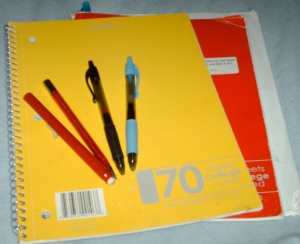Get your mind out of the gutter. I was going to say “pens.”
I spent an hour or so with the notebook and a pen this afternoon, hand-writing what turned out to be a good scene. It was full of both love and laughter — what more can you ask?

When I left my makeshift office at Burritos Fiesta, I started to think about the tools I write with — mainly because my favorite pen had run out of ink the night before, and the one I started using just didn’t have the same feel or flow.
Don’t get me wrong: I love writing utensils and have quite the collection of pens, in a rainbow of colors. But some do write better than others. In college, I was a Pilot girl. I bought Pilot fine-tipped ballpoint pens in every available color because I loved the way they wrote.
Even now, I’m a Pilot pen lover. But today I use the G-2 gel writers (still in many colors). In fact, my pen that bit the dust Friday night was a standard blue G-2.
I love everything about the G-2: The way it feels in my hand, with just the right weight and heft … the way the ink flows from it, making it easy to capture my thoughts quickly … the way it doesn’t smear …
I’ve used my share of pencils, too, mostly mechanical ones. My favorite was (and still is) a Scripto refillable pencil with thick lead. I can’t tell you how long I’ve had mine, or if the lead refills are even available anymore. But I can tell you that words flow pretty well for me with it, too. And that lead, unlike a lot of mechanical pencil lead, rarely breaks.
So tell me, what are your favorite writing tools? Any other G-2 fans out there? Surely I’m not alone!